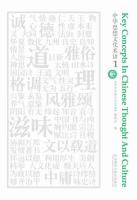Reflections
久酿团子
In the vast expanse of Chinese cultural history, Key Concepts In
Chinese Thought And Culture 1 stands like a shining lighthouse,
illuminating the path for us to explore the ancient wisdom. This book is
far from being just an ordinary collection of terms. Instead, it is a
delicate key that unlocks the door to understanding the profound
connotations of Chinese ideological and cultural heritage. At the
first glance of reading this book, one can immediately sense the
painstaking efforts in its compilation. It has meticulously selected a
multitude of representative terms, ranging from philosophical concepts
such as "Tao" and "Li" to literary ideas like
"Feng Ya Song" and "Wen Yi Zai Dao". Each term is
like a brilliant pearl, and this book strings them together with the
golden thread of thought and culture, creating a dazzling necklace.
As I delved deeper into the reading, I was amazed by the profound
philosophy underlying these terms. "Tao", as one of the core
concepts in Chinese culture, permeates various ideological schools,
including Taoism and Confucianism. In Taoism, "Tao" emphasizes
conforming to nature and pursuing absolute freedom of the individual
spirit. In Confucianism, "Tao" focuses more on the social and
ethical order and moral principles. Although they have different
emphases, both reflect the profound contemplation of the ancient Chinese
on the universe and life. This diverse yet unified ideological system is
precisely a manifestation of the broad and profound nature of Chinese
culture. The book's interpretation of literary terms also enabled me
to appreciate the unique aesthetic charm of Chinese literature.
"Feng Ya Song" is not merely a classification method of The
Book of Songs but also represents different poetic styles and social
functions. It makes us understand that in ancient times, poetry was not
only an expression of literary art but also a mirror reflecting the
social landscape and political rise and fall. The concept of "Wen
Yi Zai Dao" reveals the social responsibility that Chinese
literature has shouldered since ancient times. Literary works should not
only pursue ornate language but also carry morals and thoughts, so as to
educate the public and transform social customs. These terms are not
just literal symbols but the crystallization of the collective memory of
the Chinese nation. They have witnessed the value orientation, way of
thinking, and aesthetic taste of the Chinese nation in different
historical periods. They have come from ancient times, weathered the
baptism of time, and still exist vividly in our cultural bloodstream,
influencing our behavior patterns, value judgments, and cultural
creations today. Through reading this book, I have deeply recognized
the strong vitality and unique charm of Chinese ideological and cultural
heritage. It makes me more firmly confident in our culture in the era of
globalization. We are in an era of the collision of diverse cultures,
with Western cultural trends constantly pouring in. However, when we
look back, we can discover the treasure trove of Chinese culture, which
is an inexhaustible source of wisdom for solving many problems in modern
society. For example, the principle of moderation and balance advocated
by the "Golden Mean" thought has important implications for us
to maintain inner peace and harmony in the fast - paced life. Key
Concepts In Chinese Thought And Culture 1 is an exceptional masterpiece.
It builds a bridge for us to communicate with the ancients, allowing us
to transcend time and space and draw on the wisdom of our predecessors.
It also reminds us that as inheritors of culture in the new era, we have
the responsibility and obligation to pass down these precious cultural
heritages and carry them forward, so that Chinese ideological and
cultural heritage can shine more brilliantly in the forest of world cultures.



 京公网安备 11010802032529号
京公网安备 11010802032529号